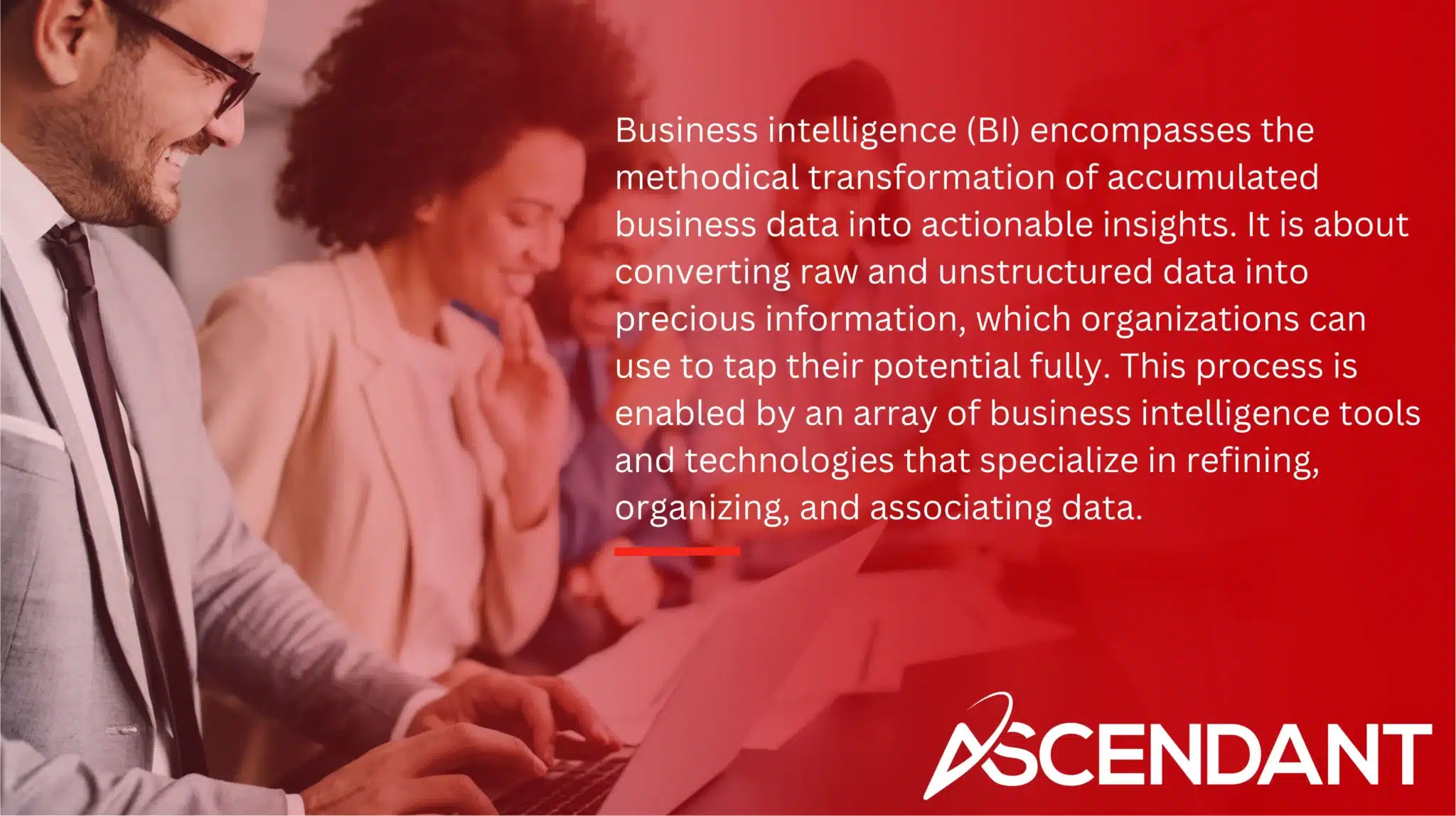This article will explore the top 10 benefits of Business Intelligence (BI), which has the power to transform your company’s operations. It offers significant perks including enhanced informed decision-making, elevated data quality, and cost reductions. We’ll demonstrate how BI can significantly boost your business performance.
Key Takeaways
- Business Intelligence (BI) converts raw data into actionable insights, enhancing decision-making and operational efficiency across various industries.
- Key benefits of BI include improved data management, enhanced data access, better productivity, and the ability to derive timely insights for informed decision-making.
- Successful BI implementation requires careful planning, appropriate tool selection, data governance, and addressing challenges such as change resistance and data quality issues.
What is Business Intelligence (BI)?

Business intelligence (BI) encompasses the methodical transformation of accumulated business data into actionable insights. It is about converting raw and unstructured data into precious information, which organizations can use to tap their potential fully. This process is enabled by an array of business intelligence tools and technologies that specialize in refining, organizing, and associating data.
To steer strategic operations effectively, managers and executives utilize these BI tools to facilitate informed decision-making processes. Business intelligence offers a spectrum of analytic options from examining historical data with descriptive analytics to providing real-time insights pertinent to present-day business strategies—thereby affording companies a competitive edge through the adoption of decisions rooted in solid data analysis.
Key Benefits of Implementing Business Intelligence
Integrating Business Intelligence (BI) into your company can dramatically reshape the way business functions are carried out. It allows for effective collection, analysis, and integration of crucial data that is instrumental in making informed decisions while also boosting financial success. BI tools significantly improve ease of managing data as well as its accessibility and quality, offering insights that underpin intelligent choices rooted in solid data.
Outlined below are ten principal advantages you gain by incorporating BI within your corporate framework.
Simplified Data Management
Business Intelligence tools offer the key advantage of streamlining data management. By efficiently integrating and processing information from diverse data sources, BI simplifies the complexity inherent in managing large datasets. This is extremely valuable in areas such as healthcare where handling extensive patient information can lead to better care provision and more efficient operational procedures.
The organization and accessibility of data fosterered by Business Intelligence result in a significant enhancement of business performance. Through this organized approach, businesses gain clarity that directly impacts their decision-making processes positively.
Enhanced Data Access
Business Intelligence enhances the flow of data throughout the organization, dismantling barriers and guaranteeing that all pertinent stakeholders have access to precise and current information. By consolidating data from various sources, BI tools enable employees to quickly and autonomously obtain required information.
Such empowerment decreases dependence on IT departments and promotes a culture within the company that places greater emphasis on making decisions based on solid data.
Boosted Productivity
By enhancing data access and enabling improved collaboration, BI tools play a crucial role in elevating workforce productivity. In sectors such as banking, these tools contribute to heightened operational efficiency through the analysis of performance metrics and the establishment of benchmarks.
Employees gain the advantage of more efficient collaboration thanks to BI tools, which frees them up to focus on additional significant projects. This results in an uptick in both overall business performance and workforce productivity.
Timely Insights
Access to precise information without delay is crucial for informed business decision-making. Swift and accurate reporting capabilities are delivered by Business Intelligence systems, which assist in making timely decisions and permit businesses to modify their strategies quickly and precisely, influenced by a variety of insights.
Such dynamic features guarantee that companies stay nimble and can swiftly respond to fluctuations in the market as well as customer demands.
Improved Data Quality
Business Intelligence enhances data quality by cleaning and validating data, leading to more accurate business insights. By aggregating data from various sources into one place, BI ensures that all employees access the same quality data for decision-making.
Data lineage tracking and governance tools also help organizations assess their data quality, further enhancing the accuracy of BI reports.
Informed Decision-Making
Utilizing BI tools enables users to access visual representations like dashboards and reports, which facilitates the swift comprehension of business insights necessary for making knowledgeable choices. The interaction with data via integrated dashboards enhances team collaboration and provides a clearer understanding of business performance.
As a result, teams can make quicker, more informed decisions based on actionable insights. This advancement significantly bolsters strategic decision-making processes, leading to enhanced business results.
Cost Reduction
Business intelligence notably enhances efficiency by simplifying business processes and curtailing operational errors, which is a primary advantage. This streamlining effect of BI leads to a reduction in operational expenses as it tackles the issue of mistakes and inefficiencies head-on.
Employing Business. Intelligence tools for automating the generation and examination of reports slashes not just expenses but also the manual labor typically required for these activities, thus yielding considerable savings in costs.
Trend Identification
Utilizing business intelligence enables companies to detect and adapt to emerging trends in the market. Through the examination of external market data, BI grants businesses a clear view into prevailing commercial tendencies, empowering them to preemptively discern obstacles that impede their advancement as well as uncover fresh opportunities.
Such proficiency is essential for gaining an upper hand over rivals and preserving a competitive advantage within the marketplace.
Customer Behavior Analysis
Companies harness BI tools to delve into customer behavior, gaining crucial insights that bolster marketing approaches and elevate customer contentment. Retailers, for instance, can leverage BI in dissecting purchasing trends and preferences among customers. This data enables them to craft personalized marketing campaigns and refine inventory control.
In the banking sector, BI assists in forecasting client behaviors, which facilitates the creation of customized financial offerings designed to address individual requirements. By utilizing these aspects of BI, institutions can significantly enhance user experiences leading to heightened fidelity amongst customers as well as improved retention metrics.
Increased Revenue and ROI
Leveraging BI tools can substantially boost revenue creation by pinpointing products that perform well and uncovering opportunities for cost-saving. Through the analysis of vast datasets, BI facilitates revenue optimization through the identification of areas to cut costs as well as gaining insights into customer behavior and purchase tendencies.
Implementing sophisticated BI techniques like predictive modeling and machine learning elevates risk management and adherence to regulations, offering businesses a distinct competitive advantage which leads to heightened revenue growth and an improved return on investment.
How Business Intelligence Enhances Different Industries

Business Intelligence solutions are tailored to meet the diverse needs of various industries, including retail, banking, and healthcare. In each sector, BI delivers critical insights that empower organizations to anticipate market trends and enhance their operational efficiencies.
In this section, we will delve into the ways in which BI contributes significantly to these distinct industries by showcasing its adaptability and profound influence.
Retail
Within the retail industry, tools for Business Intelligence are utilized to forecast demand and monitor variations as time progresses, guaranteeing that inventory quantities correspond with what customers need. Utilizing BI enables retailers to fine-tune their stock amounts to better fulfill consumer demands, gain insights into customer behavior patterns, and refine their pricing tactics using sales information.
The knowledge gained from these analytical processes elevates the level of customer satisfaction and loyalty, which in turn boosts the overall efficacy of business operations.
Banking
In the financial sector, Business Intelligence (BI) plays a crucial role by identifying key performance indicators and monitoring the efficiency of operations. Through thorough data analysis, BI enables banks to develop potent marketing tactics and enhance their relationships with customers.
BI underpins learning management endeavors within banks, promoting continuous advancement and enhancement in their operational procedures.
Healthcare
In the healthcare sector, utilizing Business Intelligence (BI) to advance data analysis results in improved decision-making and operational effectiveness. By employing BI tools, healthcare institutions are able to boost patient care quality, refine the distribution of resources, and smoothen their procedures—thereby elevating overall business performance as well as achieving higher levels of customer satisfaction.
Implementing Business Intelligence Successfully
Executing a Business Intelligence strategy effectively necessitates meticulous preparation and deployment. Establishing precise goals and key performance indicators (KPIs) is imperative to identify the particular issues that BI endeavors to address. It’s critical to choose appropriate BI tools in alignment with well-defined requirements, while also guaranteeing they fit seamlessly within the current data infrastructure.
Forming a varied team dedicated to BI—which includes experts from relevant fields alongside roles specialized in BI—is essential for proficient handling and application of these tools. Conducting training programs for end-users is indispensable so employees are equipped with the knowledge needed to operate the BI tools competently, drawing out valuable insights which contribute to triumphant implementation of business intelligence.
Choosing the Right BI Tools for Your Business
Choosing the right business intelligence software can be a challenging and intricate task, given the extensive array of choices on offer. Recommended tools for enterprise reporting include Qlik, Tableau, and Power BI owing to their proven track record in the market and their comprehensive features.
For organizations that are just beginning to explore business analytics, cost-effective solutions such as Power BI Pro and AWS QuickSight could be more suitable. It’s essential to evaluate how well these tools perform alongside your cloud-based back-end data platform to guarantee they operate efficiently.
The Role of Data Governance in BI
A strong data governance framework is essential for Business Intelligence as it improves the quality of data and bolsters data security. This strategy sets guidelines for managing information, which reduces duplicate records and optimizes the efficiency of BI operations. It also makes certain that sensitive information is accessible only by approved users, thus preserving confidentiality and aiding in adherence to legal standards.
When combined with BI tools, a well-implemented data governance ensures that the analyzed information remains secure, properly managed, and dependable.
Common Challenges in BI Implementation
Instituting Business. Intelligence systems can be fraught with difficulties, and it is important to acknowledge several crucial considerations.
- It’s imperative to surmount the barriers of resistance to change for the successful implementation.
- Emphasizing strategies for managing change is vital in securing user acceptance and engagement.
- Challenges relating to data quality and governance can impede the effectiveness of BI initiatives.
- Elevating practices for data cleansing and validation takes precedence if one aims at optimal functionality.
By tackling these challenges head-on, organizations stand a better chance of effectively rolling out Business Intelligence systems.
The scarcity of well-versed BI experts presents a formidable obstacle that necessitates corporate investment in training programs while fostering synergies with academic entities that specialize in producing such expertise. Integrating BI solutions into pre-existing data ecosystems may present intricate issues. Adherence to uniform protocols along with collaboration from skilled developers offers a strategy for mitigating potential complications within this realm.
Future Trends in Business Intelligence
Business Intelligence’s landscape is being redefined through the rise of AI and sophisticated data analytics techniques. Industries are revolutionizing their approach to analyzing data by leveraging ‘AI Data Analysts,’ which empowers human analysts to concentrate on strategic matters rather than mundane activities. As technologies in advanced analytics progress, they promise more profound insights and enhanced predictive prowess.
For organizations aiming to keep a competitive edge in a world that heavily relies on data, adopting AI and state-of-the-art analytics is becoming essential.
Summary
In essence, the adoption of Business Intelligence is a game-changing strategy for handling data that streamlines data management, bolsters access to information, and refines decision-making processes. By successfully integrating BI tools, companies are able to cut expenses, pinpoint emerging trends, boost customer satisfaction and consequently amplify their revenues and investment returns. As Business Intelligence continues to progress alongside AI and sophisticated analytics techniques, enterprises employing these innovations will sustain an advantage over competitors. Harnessing the force of BI can unleash your company’s utmost capabilities by maintaining a sharp competitive edge in the marketplace.
 Frequently Asked Questions
Frequently Asked Questions
What is Business Intelligence (BI)?
Business intelligence (BI) involves transforming raw data into valuable insights that can be acted upon, thus providing essential information to facilitate informed strategic decision-making.
Through this process, businesses are able to improve their operational effectiveness and gain a competitive edge.
How does BI improve data quality?
BI improves data quality by implementing cleaning and validation processes, aggregating data from multiple sources, and utilizing governance tools for accurate data lineage tracking.
This leads to more reliable and trustworthy data insights.
What are the key benefits of implementing BI?
Utilizing Business Intelligence (BI) presents considerable benefits, including improved management and accessibility of data, increased efficiency in productivity, and the acquisition of prompt insights that enable the detection of trends and examination of customer behavior.
Such implementation culminates in diminished expenses and an escalation in income, thereby optimizing the return on investment.
How can BI be successfully implemented?
Effective utilization of BI resources and the fostering of a data-driven culture depend on a strategic approach that includes setting clear goals, choosing suitable tools, forming a multidisciplinary team, and providing training to end users. These elements are critical for successful BI implementation.
What future trends are shaping BI?
The future of Business Intelligence (BI) is significantly influenced by the increasing integration of AI and advanced analytics, enhancing data analysis and improving predictive insights.
This trend will shape how organizations leverage data-driven decision-making in the coming years.

